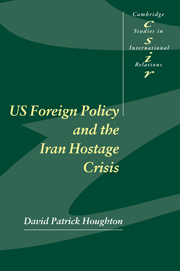Book contents
- Frontmatter
- Contents
- Preface
- 1 Jimmy Carter and the tragedy of foreign policy
- 2 Locating the argument: a review of the existing literature
- 3 The origins of the crisis
- 4 The waiting game
- 5 Days of decision: the hostage rescue mission
- 6 Hostages to history
- 7 Some alternative explanations: non-analogical accounts of the Iran decision-making
- 8 Conclusion
- Appendix 1 Dramatis personae
- Appendix 2 The major historical analogies used
- Bibliography
- Index
- CAMBRIDGE STUDIES IN INTERNATIONAL RELATIONS
6 - Hostages to history
Published online by Cambridge University Press: 22 September 2009
- Frontmatter
- Contents
- Preface
- 1 Jimmy Carter and the tragedy of foreign policy
- 2 Locating the argument: a review of the existing literature
- 3 The origins of the crisis
- 4 The waiting game
- 5 Days of decision: the hostage rescue mission
- 6 Hostages to history
- 7 Some alternative explanations: non-analogical accounts of the Iran decision-making
- 8 Conclusion
- Appendix 1 Dramatis personae
- Appendix 2 The major historical analogies used
- Bibliography
- Index
- CAMBRIDGE STUDIES IN INTERNATIONAL RELATIONS
Summary
The American and Iranian decision-makers, as we have seen, overwhelmingly drew upon the experiences and analogies known to them personally, reflecting the greater cognitive availability of these events. The Entebbe analogy – a then very recent political and policy success – played an enhanced (if only partially visible) role in the policy discussions of the Carter administration, and probably influenced Carter's eventual decision to mount a rescue operation, while other analogies exerted an impact at various stages of the crisis. Jimmy Carter and those surrounding him clearly considered various analogous situations and searched through them for cause and effect patterns. The president and his advisers seem to have made an early effort – albeit perhaps an informal one – to gather together potential precedents, and to search these for usable lessons which could then be applied to the current case. According to Brzezinski's recollection, ‘at some point early on, we simply collected previous cases in order to see what happened and how they were handled, so either my staff or I gave it to him ... I doubt whether he would have known of all these cases himself’. As Carter himself put it at a press conference on 21 April 1980, ‘I have studied all the previous occurences in my lifetime where American hostages have been taken ... to learn how they reacted and what the degree of success was’.
- Type
- Chapter
- Information
- US Foreign Policy and the Iran Hostage Crisis , pp. 144 - 165Publisher: Cambridge University PressPrint publication year: 2001



